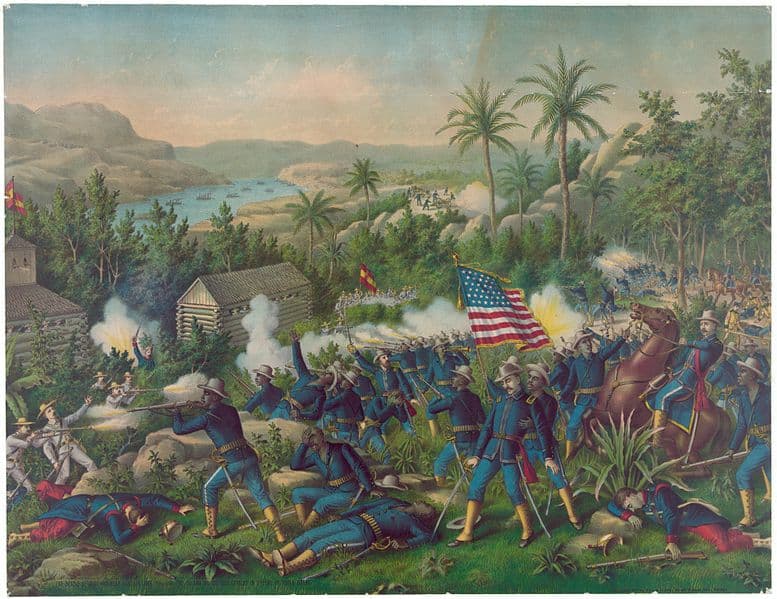Remembering the ‘Buffalo Soldiers’ Who Died To Spark the American Century
Lieutenant John J. ‘Black Jack’ Pershing said the Buffalo Soldiers ‘fought their way into the hearts of the American people’ at a key moment in the Spanish-American War.

As Americans mark Memorial Day, 26 Black men — members of the U.S. Army’s all-Black military units, known as “Buffalo Soldiers” — deserve commemoration. By answering President Theodore Roosevelt’s call to charge at a critical moment in the Spanish-American War when many white regulars refused to follow a volunteer officer, they helped propel him and his distant cousin, President Franklin Roosevelt, to greatness.
The Spanish-American War is little remembered in part because President McKinley applied the lessons he learned in the Civil War to bring it to a successful conclusion after Madrid declared war over an ultimatum to free Cuba.
The Buffalo Soldiers, the 9th and 10th Cavalry, held the far-right flank beside Roosevelt’s Rough Riders, the 1st Volunteer Cavalry. From this position, with their backs to the San Juan River, their commander, Lieutenant John J. “Black Jack” Pershing, said the Buffalo Soldiers “fought their way into the hearts of the American people” as the main attack collapsed.
Mr. Roosevelt called the hot, humid day of July 1, 1898 his “crowded hour,” launching him in the next three years to New York’s governorship, the vice presidency, and the White House upon Mr. McKinley’s assassination.
Although Mr. Roosevelt is remembered as leading the charge up San Juan Hill, the name was in dispute, used by the newspapers of William Randolph Hearst and Joseph Pulitzer because it sounded better than Kettle Hill, a distinction the Sun asked Mr. Roosevelt to clarify.
Mr. Roosevelt, who grew tired of the question, quipped later that he hadn’t asked the hills for their names before charging them. “It wasn’t even much of a hill,” he said, “just a slope,” but it’s not disputed that enemy batteries made it a hard objective for his dismounted cavalry to take, and the Rough Riders couldn’t have done it alone.
A Spanish lieutenant, Jose Muller, said his men “threw forth a hail of projectiles upon the enemy, while one company after another, without any protection, rushed with veritable fury” toward their positions.
One Buffalo Soldier, Edward L. Baker, earned the Medal of Honor for pulling a wounded private out of the river, ignoring the warnings to stay under cover. Mr. Baker was wounded twice by shrapnel in the charge but refused to be stopped by bullets or barbed wire.
Mr. Baker described his men “advanced rapidly … under a galling, converging fire from the enemy’s artillery and infantry,” often fighting hand to hand. He reached the summit to help rout its defenders.
“Colonel Roosevelt,” the Sun reported, “is not easily turned aside from speaking of the brave men he came to know in Cuba.” Mr. Roosevelt said, “No one can tell,” if it was his men or the Buffalo Soldiers, “who came forward with the greater courage to offer their lives in the service of their country.”
Twenty-six Buffalo Soldiers gave their lives to capture the hill. In later years, Roosevelt downplayed their service in shocking language — saying the Buffalo soldiers “were shirkers in their duties and would only go as far as they were led by white officers.”
A trooper with the 10th, Presley Holliday, said the “statement was uncalled for and uncharitable,” speaking for his dead comrades who could not speak for themselves, praising “the moral and physical effect the advance of the 10th Cavalry had in weakening” the Spanish positions.
Mr. Roosevelt’s comments, Mr. Holliday said, were “altogether ungrateful” and had “done us an immeasurable lot of harm,” before refuting that all “colored soldiers who took part in the assaults were led or urged forward by a white officer.”
In 1928, Mr. Roosevelt’s fifth cousin, President Franklin Roosevelt, eked out a victory for governor of New York by six-tenths of a percent. While it’s impossible to quantify name recognition, he piggybacked on his predecessor’s heroics.
By Franklin Roosevelt’s day, Cuba was legendary, with history’s lingering image of the war Theodore Roosevelt standing with his Rough Riders, American flag unfurled, atop the hill they captured with the Buffalo Soldiers — an honorific given them by Cheyenne warriors.
Today, the smoke of the cannons has dissipated, and we can see a clear picture of the Buffalo Soldiers’ role in forcing the end to Spain’s cruel colonialism. The sacrifice of their fallen began the American Century, propelling two of its most significant presidents into the White House, and their own legend into the hearts of the American people.

